#should i tag this as meta?
Text

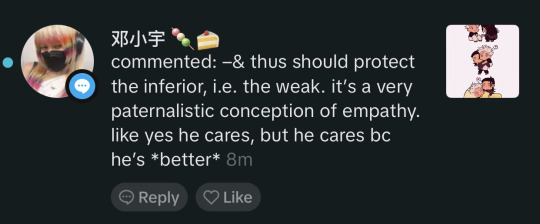

this was commented a while ago on my tiktok (it was about this post), but it’s so good, it’s stayed on my mind ever since. i’ve been meaning to talk about this for a while!
on geto & empathy.
let’s address the likely reason why people tend to see geto in this empathic light and through this lens that almost absolves him from blame.
the hidden inventory arc, especially towards the end, was written in a way that humanized geto; we read his mind, we saw his thoughts and how he processed them, we shadowed him as he went through traumatic event after traumatic event. we were placed in his shoes as he ran through a never-ending marathon—essentially, we were him in his moments. we’re supposed to empathize with him.
it’s why at first hand, his defection might’ve seemed like a logical conclusion to us. it made sense. (unlike how it was for every other character in the story, and especially how it was for gojo—geto’s decision came to them all as a shock.) this is what makes him a well-written character and an overall excellent villain.
it’s also probably why geto is such a personal character to many people, but this intimate association doesn’t make him faultless. yes, he was a victim of circumstance, but so was everyone else in the story. geto was also a perpetrator who inflicted harm on other people: a genocidal cult leader who had his eyes set on the greater good, someone who disregarded the means for the end. “well-written,“ in my opinion, also means multifaceted, complex.
now let’s talk about geto pre defection.
geto is gojo’s foil. at first read, he’s supposed to contrast gojo in a way that highlights specific aspects of gojo’s character. (and vice versa, but this arc is also called “gojo’s past arc” for a reason; gojo is our main character in this part of the story, he is our point of reference.) geto serves as a comparison to gojo, but he also stands as his own character. where gojo failed to empathize with the “weak,” geto succeeded. but what was empathy to geto anyway?
empathy, in its colloquial connotation, is seen as a virtue. it’s a community-building tool and it’s inherently human. it’s how we contextualize our place in the world and our connection to other people. in broad construct, it’s a “good” quality to have, to be empathic—but not all forms of empathy are the same.
geto’s empathy towards the “weak” was, in a word, paternalistic—like how a father would interact with his children, or how a deity or a king would interact with their subjects. it stemmed from his arrogance and his “well-meaning” saviorism tendencies: in short, “i am better than you, therefore i know better than you. i know what’s best for you.” this is especially true in regards to his patronizing attitude towards non-sorcerers pre defection (and it extends post defection, too).
geto’s sense of duty as a sorcerer manifested in how he assumed responsibility, and to a lesser extent, authority over non-sorcerers. it’s a type of benevolent prejudice; these people are powerless and weak, therefore inferior to him, and so it’s his job to protect them, it’s his job to care. while he had good intentions, he saw them as “lack,” not as humans who were ultimately just different from him. he saw them as helpless victims of themselves; which, given his occupation at the time, was an apt contextualization, but within the bigger picture, it ironically dehumanized non-sorcerers. it was underhandedly condescending, whether he was conscious of it or not.
the very root of his defection is this: he did not view non-sorcerers as equals to him in the first place. sure, plenty of other sorcerers also have this mindset, especially the very powerful ones, but geto made this the basis of his purpose, taking on the moral high ground by giving it meaning. after toji and after mimiko and nanako, he recontextualized and changed the meaning of what it meant to be powerful—but while his circumstances and his proximity to non-sorcerers changed (him revoking his empathy towards them), the patronizing way he viewed them (“monkeys” now) was constant; it was his pivot foot from charitable pity to resentment and hatred.
some things to consider: i assume geto was fairly new to the jujutsu scene in the hidden inventory arc, given his non-sorcerer family. i also assume he must’ve felt very alone prior to his enrollment, being the only one in his family to see cursed spirits, and possibly the only one in his childhood environment. this grand introduction to a some sort of a secret society must’ve felt special to him; it must’ve made him feel special, especially considering he was put on par with the kid who everyone thought was immensely powerful.
i can see why he thought himself better compared to the non-sorcerer background he grew up in. plus, it would be hard to not let your ego inflate when someone like gojo keeps referring to you as half of “the strongest duo.”
i also think that despite how black and white and consequential his outlook on life was before and after his defection, he probably still had his doubts and moments of wavering throughout his decade-long career as a curse user. i mean, he said it himself—his goal is only possible for one person only, and it’s not him. that could definitely be a factor, and it could also be some lingering sentimentality, too. he burned the bridge between him and his past and he just couldn’t risk the distance, but he probably thought of it sometimes.
i’ll end this post with a quote from him from the anime that made me really think. geto does care, but at such a young age, it was a juvenile and idealistic concept of “care.” had he stayed and grown up a little, worked through the trauma and organized with his fellow sorcerers (instead of assuming responsibility alone like he did, leaving to create a better future for sorcerers without including them in his plans), perhaps he could’ve made this a reality:
“survival of the weakest. that’s how a society should be. the weak help each other and discourage any who are too strong.”
414 notes
·
View notes
Text
.
I think Shen Yuan's reluctance to accept his own feelings and emotions is the crux of why he unintentionally hurt LBH, or at least I think it's allegorical for something similar. He's a neurodivergent 20 something year old who's in the closet and represses his emotions, he's definitely not a guy to be trusted by words but rather action.
When he doesn't want to come to terms with something he either denies it, doesn't think about it, or pretends it's because of something else.
(if we wanna take this further off tangent onto an analysis of depression: I relate to these feelings quite a bit. Mental health issues are a work in progress within society, and when you feel that way you expect there's supposed to be a "reason" for feeling that way.
You have a good life, a good family and home, so why are you feeling this way? Why aren't you happy? Why do you feel different? You don't want to be different.
Shen Yuan could be feeling this way, but he wouldn't say it, or think about it, because even if he is, he doesn't want to be so he just won't be.)
Oh he's depressed? No he isn't. He's gay for Binghe? Nope, he's as straight as an arrow he just appreciates Binghe's dick from time to time like a normal heterosexual male. He's crying? No see it's just the sun in his eyes or the pain he felt earlier. His balls hurt looking at Binghe? Oh man it must be because of the cold room or the fear.
Oh he keeps dying? (Crickets)
Nobody wants to be different. Shen Qingqiu wants to be normal and he'll tell you he's normal. But he's not normal. That guy's a fucking weirdo.
Because he refuses to acknowledge his own feelings and depersonalizes, he in turn fails to acknowledge his own surroundings and his effect on people.
The transmigration aspect is taking the allegorical to the literal, he sees people and his surroundings as characters, through the story he learns not only of the effect he has on these "characters" who are now real people in his eyes, but this also coincides with him coming to terms with his own hang ups, his feelings, and his sexuality.
Because of his own lack of acknowledgement towards his own feelings and the way he evades those emotions, he hurts Binghe in the process. It's only when he learns to acknowledge the change he caused within Binghe and his feelings he had for Binghe, that's when they can finally mend their relationship.
Anyway both of them are deranged but they're deranged together 💞. They're both so fucked but fucked enough to the point that the mess tangles up in odd places and weirdly enough those pieces just end up fitting.
See, the strange and almost voyeuristic dynamic they play up where the crybaby disciple gets himself lightly scolded and comforted by his teachermommy is healthy for them. In a very strange and fucked up Freudian way.
And you need to understand, the uncomfortable milf and little baby roleplay they do in public is, in fact, very productive for their relationship and it's vital everybody and their grandmother is watching them, see, it's very therapeutic actually
Wait where are you going
#svsss#bingqiu#text post#should i tag this as meta?#meta#i posted meta im at a new low point in life 😔
86 notes
·
View notes
Text
Why the hell is JJK 270 called Dream's End?
JJK 270 being titled Dream’s End is so fudging ominous. That’s some Umineko type beat. I’m not sure if I should even judge this chapter as presented because of this. In fact, I'm holding off on posting the other analysis I had for today since I no longer am certain of what JJK 268–270 are.
There's two lines of thought I have:
1) Gege suffering from burnout and bad working conditions plus rushing has caused the writing to decline.
2) Gege still has a hidden ace saved for the final chapter and the weird writing is deliberate.
I'm going to humor Option 2, but only because the title of this chapter is called Dream's End.
(The most 'hear me out' discussion under the cut. Using TCB scans and leaks. Click images for captions/citations.)
[Small Update: Follow-up Discussion on why everyone feels OOC.]
Preface
"Without love it cannot be seen."
This is a phrase and philosophy I have borrowed from Umineko since I've started these JJK yapfests. It essentially boils down to 'discard your negative biases and try to examine things in good faith.'
JJK 268 & 269 have fudging tested that for me. I've been giving Gege and the characters a pretty hard time with the caveat of knowing how exploitative the manga industry is. I initially rejected the idea that these chapters were to be taken at anything other than face-value because of this. In fact, I cited the JJK 268 chapter title of Finale as a reason I've accepted things as is.
And with that same logic, I'm now doing the opposite... So hear me out! I've got some pretty good reasons to be doing this.
What's wrong with JJK 268–270?
There's a lot of things in these chapters that are fundamentally inconsistent with what's been established in throughout the manga. If we use Option 1 to explain these contradictions, these are last second retcons because Gege forgor.
Option 2? We're about to have the rug pulled the hell out from under us because the last 3 chapters have been delusions.
What first tipped me off to something possibly being wrong on purpose was the fate of the incarnated culling game players in JJK 270. Not too long ago it was established that the souls of non-sorcerers in vessels were unsavable.
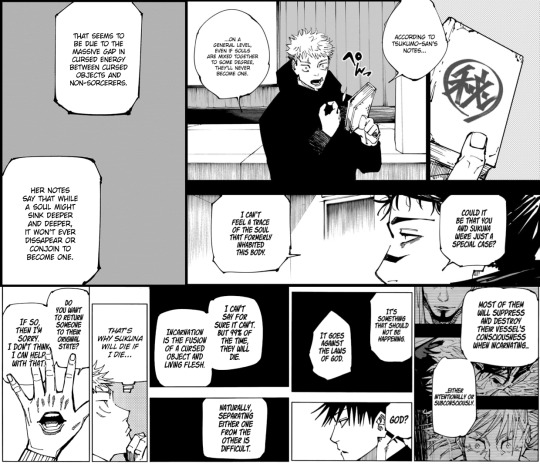
The souls are suppressed in a way that distorts them permanently or their consciousness is outright destroyed. They were gambling on Megumi's survival due to him being a sorcerer and Sukuna's incarnation method being unique. 99% of them will die and those who survive will likely be vegetables, so why is there a sudden gamble on their survival in JJK 270?
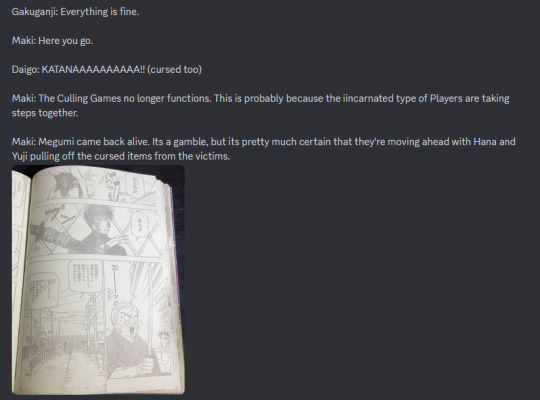
It's such a neat and fine bow to tie this mess up that goes directly against existing lore. It's so ideal that it has me suspicious.
Brain damage from sorcery on non-sorcerers has been established as extremely taxing. I think about Gojo's Unlimited Void (UV) the most when it comes to this. Non-sorcerers were hit by it for 0.2 seconds and required medical intervention for 2 months to fully heal from it. Sukuna, the absolute strongest, tanked some of it and it affected him for the rest of the battle. ...And then we have Megumi who was under it for about 6 minutes and seems to have very little problems from it.

This is bizarre. Someone who underwent the month long bath and UV without Reverse Curse Technique (RCT) should be struggling to even stand after waking up. Sukuna had RCT and the Gojo brain damage still took him out. This screams of inconsistent writing unless...this is a deliberate hint that something is amiss.
I want to draw attention to the panel Megumi's UV damage is addressed. Just about everyone has been seemingly waiting around in the same spot for him to wake up. It's a bit weird given that sorcerers don't usually do that. They usually get a move on asap. And after the destruction of Shinjuku and the Culling Game Players still running about, why would they take a breather to discuss their plans that worked?
But that's not what started bothering me about that panel after reading JJK 270. It's that characters who aren't in the room, start appearing without warning. Look who is behind Maki and to the left. It's Kusakabe. And to her and Yuta's right? Inumaki. So why is it that Hakari, Kiara, and Ino are in Kusakabe's place while Todo spawns where Inumaki is? (And Yuta is facing the wrong direction too.)

That's pretty fudging weird right? You can chalk it up to Gege forgor but it doesn't stop there. Higuruma enters the discussion in a way that causes Yuji to pause.

Why is Yuji surprised to see him? (And where the fudge did he come from?) Shouldn't he know of his survival by now? And why is he in a cast? Higuruma had learned RCT and fully restored his arms before leaving the battlefield. If he's conscious, then he should be able to heal himself fully no problems.
And that got me thinking... Why is Yuji still missing his fingers?
It was established that he kept his fingers unhealed to help with Yuta's plan. This means that if he won, he has no need to keep them missing. Yuji has fully regenerated missing chunks of his face, including his eye, and stomach. He has RCT just like Higuruma. But it doesn't end there either. Yuji's number of fingers on his left hand keeps changing.
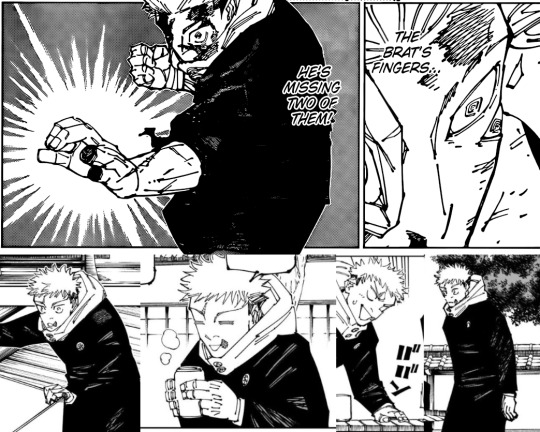
4 fingers, 3 fingers, dubious amount of fingers, 5 fingers. Once again, you can chalk it up to Gege forgor, but JJK 270 came out and the same problem started happening with Megumi's scars.
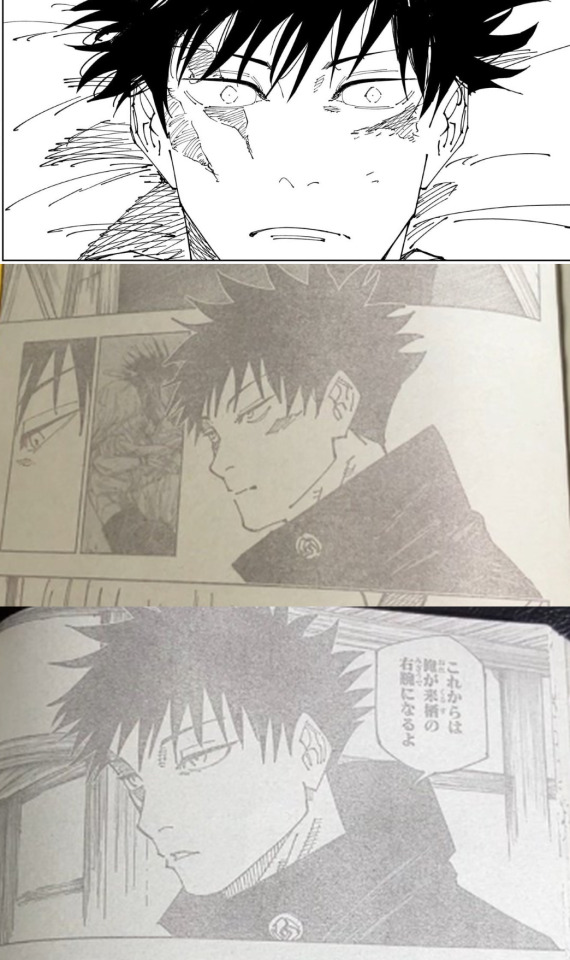
The same mistake is made within the same set of panels and very big page. That's weird.
ONCE AGAIN, you can chalk it up to Gege forgor, but when these errors occur, like with Yuta mistakenly having his ring on in JJK 251, Gege will note the mistake outright. Gege has made no such comments for Yuji's fingers or the scars. This many “errors” in row when Gege has otherwise been careful with these features could indicate it really is on purpose. (Kind of like Sukuna's everchanging mask. The thing was just moving around and pulsing. That was deliberate not inconsistency.)
What does this mean?
I think it means what we are seeing isn't reality. After all, the most common way to tell if you're dreaming is being unable to count the number of fingers on your hands. Another way to tell is the distortion of faces.
Readers have noticed that something is wrong. The weird timeskips, the lack of lasting consequences, design inconsistencies, characters behaving like similes of themselves, death and pain being glossed over like it's nothing. It all feels so off. But it's still close enough to the original to be somewhat believable. ...Is that not what it's like to dream and not know you are dreaming?
Why is it that the chapter titled Dream's End ends with the hunt for a curse user whose ability is to distort the perception of reality?
Dreams and Delusions in JJK
We already know Gege weaves Buddhist symbolism and ideas heavily into JJK. I'm not an expert in Buddhism at all, so there's a lot of it that goes over my head. I decided to look into if dreams are significant in Buddhism and boy howdy are they. Quoted directly from the source:
"Dreams can be a message from a Bodhisattva, an ancestor, or a god, The intent of the dream may be to test the dreamer’s resolve: is he non-retreating (avaivartika) from Bodhi (enlightenment) even when sleeping? The purpose of the dream visit may be to communicate information vital to the dreamer’s well-being. The Buddha himself had five dreams of catastrophes, falling stars and worlds in collision just before his enlightenment. The dreams were sent to him not by a benevolent Dharma-protector, but by an malevolent sorcerer, intent on disrupting the Buddha’s samadhi and preventing his awakening."
In summary, (correct me if I'm wrong) dreams appear to be seen as another state of being just as valuable and impermanent as reality.
There's also this other bit I'll quote directly.
"The most common use of dreams in the literature of the Mahayana, or “Northern School” of Buddhism in China, Tibet, Japan, Korea, and Vietnam is to see dreams as a simile for sunyata, (emptiness) the hollow core at the heart of all component dharmas (things). For example, in the well-known Vajra (Diamond) Sutra, the Buddha taught that:
“All conditioned dharmas, are like a dream, like an illusion, like a bubble, like a shadow, like a dewdrop, like a lightening flash; you should contemplate them thus.”"
That's starting to sound like what Yuji's Domain does, right? He projects memories that did happen and mixes them with delusions and dreams. Sukuna and Megumi both experience this in full.

It's incredibly suspicious that it hasn't been named yet. Yuji is the son of Kenjaku who has a domain based on the Womb Sutra/Realm...which is paired with the aforementioned Diamond Realm to encompass the entire Dharma. It's very likely this is what Yuji's domain is—a realm of dreams and reality combined as one.
Unreality Runs in the Family
When Sasaki Setsuko "wakes up" as the Culling Games begin, Kenjaku explains her situation with this:
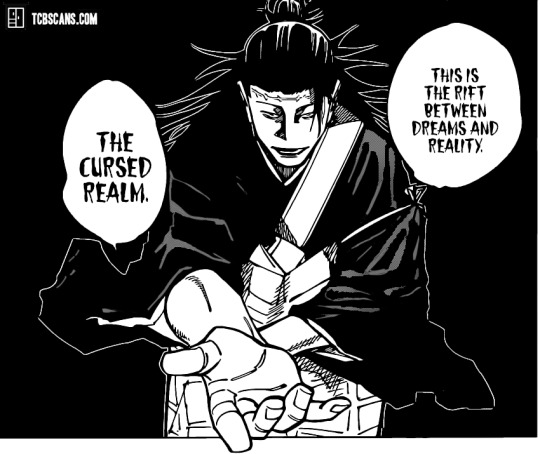
What follows is a sequence that cannot be described as a dream. It seems to be a blend of reality and hallucinations. But that's not anything strange, Sukuna does it too with Kashimo in reverse.
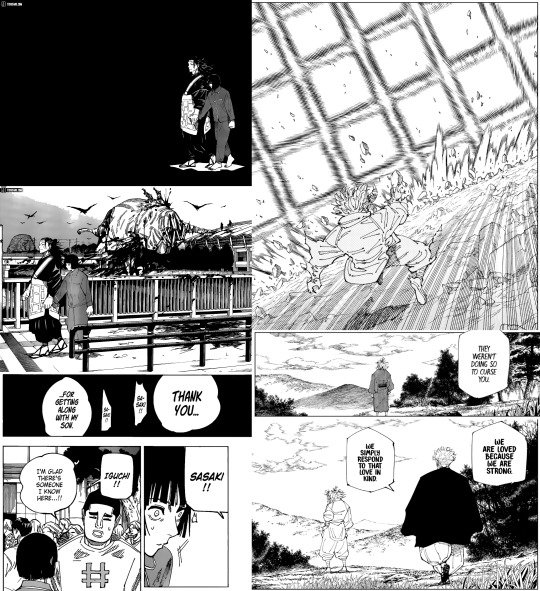
As you can see, both the positions of the characters and even the backgrounds change suddenly from reality to ??? and from sequence to sequence. It's all incredibly dream like.
Another strange thing about this space is Kenjaku creating it as a part of an escape route Binding Vow. You know, the kind Sukuna uses for Malevolent Shrine.
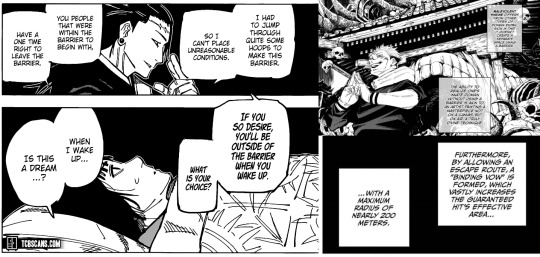
What I want to draw attention to here is this reality-dream state somewhat requires consent (in the loosest possible definition) to appear. The person entering this state has to desire it themself. We see this with Jogo and Gojo who are mutually interested in having a relationship of somekind with Sukuna. (Same with Kashimo.)
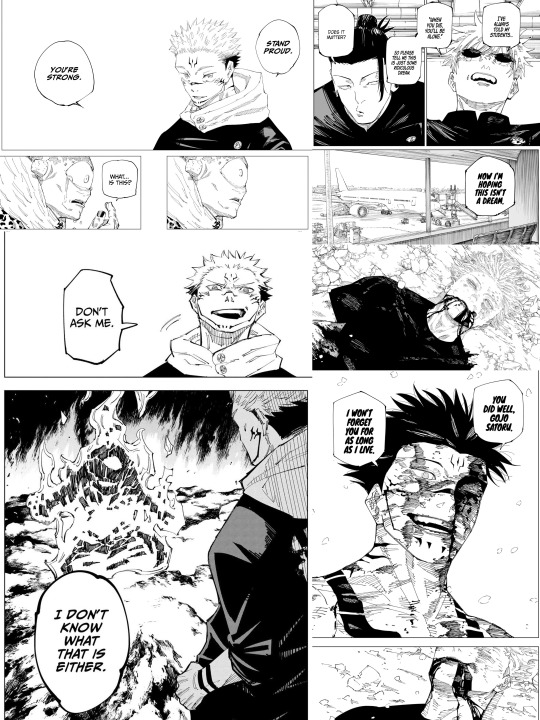
(It's also very hard to tell if they are dead or still in the process of dying during this.)
This is where the delusions Yuji projects differ. They are forced onto others when he is near death or severely injured, seemingly as a defense mechanism.
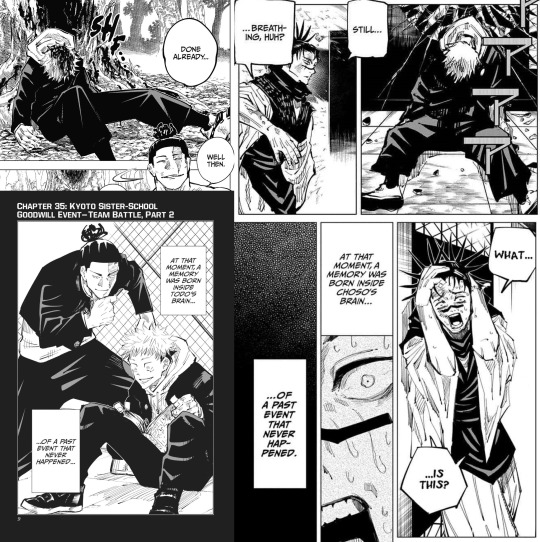
And would you look at that...the syntax is identical for Todo and Choso's Brother Yuji Delusions. "At that moment, a memory was born inside X's brain...of a past event that never happened." It's kind of like how Yuji replaces Gojo in Megumi's memory to reach him. It's also very strange that Sukuna, Choso, and Jogo go "What is this?" to this in-between space.
My point here is that Yuji having access to this space has been hinted at since the start of this manga and that it was inherited it by blood. (Totally Not Kenjaku showing up with Takaba Mr. Reality Warping CT in JJK 270 supports my case too I think.)
What does this mean for JJK 268–270?
The battle ended in JJK 268. Of that I'm certain. What I no longer know is if anyone survived.
A common complaint about Sukuna's death is his lack of an afterlife scene. Everything ended so abruptly. And then Megumi wakes up.

It's so jarring in out of place. ...But that's how all scenes involving the space between dreams and reality begin. Sasaki Setsuko "wakes up" once and then again. Most of us have experienced those kind of dreams right? (They made a whole movie about it called Inception which is based on the movie Paprika.)
There's one other thing I need to draw attention to. Yuji's Domain shattered after Sukuna cast Domain Expansion (DE).

When a sorcerer withdraws their domain voluntarily, it does not shatter. Gojo has demonstrated this for us in quite clearly.

When a domain is broken by force, it will shatter and shards will scatter. When a domain is withdrawn, no shards are left behind. Yuta uses these facts as a part of his plan. In JJK 252, it's revealed by Kusakabe that Yuta shatters his own domain on purpose to trick Sukuna into thinking he won.
What this means is that some kind of violent action needs to be taken to shatter a domain. Yuji's domain is massive and his attacks only targeted Sukuna. What could've shattered his domain all at once? He's not had the time to practice shattering parts of it like Yuta.
Gojo has shown us what a uniform domain shattering looks like—it happens when Malevolent Shrine activates. (Please note that the sfx used for Sukuna breaking Gojo's domain is カシャア. It's the same one used for Yuji's domain shattering.)
I'm proposing that we've been in unreality since the end of JJK 266. Sukuna and Yuji are both severely injured, on the verge of death, and have a connection with each other. These are all conditions that trigger the space between dreams and reality.
And I must remind you that Yuji first triggers this event with Todo after a severe head injury. Right before Sukuna casts his domain, they do this to each other.
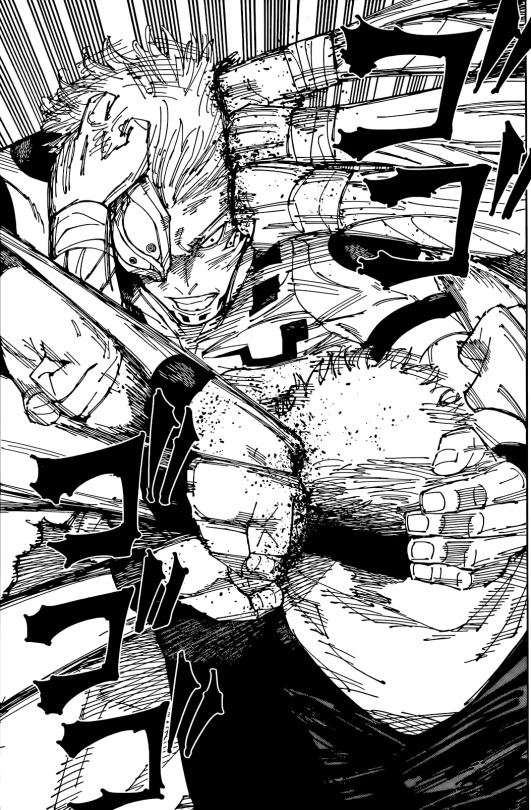
Everything that has come after has been perfect for Yuji to a unbelievable degree. Everyone whose death was uncertain is alive and the living are getting exactly what they wanted. The effort behind it and the logistics are all missing. And yes a rushed ending can explain that, but that too can be part of the ruse.
Another massive complaint is that mourning has not occurred. Not for Gojo or Choso despite how much Yuji cherished them. It's like they're being willfully forgotten by the cast despite being crucial to their success in Shinjuku. It feels out of character, especially since Yuji is of the few that showed concern for them no matter what.
But if this is a delusion on the brink of death designed to bring happiness, why would Yuji think of the dead? He's always been so avoidant with it. When his grandpa is dying and trying to talk about his parents, Yuji tells him to shut up. When Nanami dies, he thinks of him then and then never again directly leading up to his talk with Sukuna. When Megumi tries to discuss Nobara's fate, Yuji ends the conversation as quickly as possible.
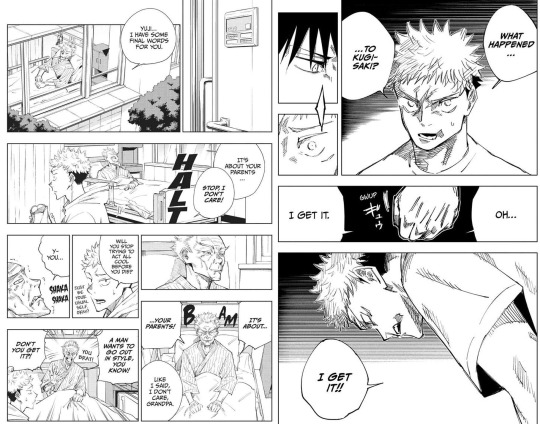
The only people in this world are the ones who may or may not be dead. He saw Yuta in Gojo's corpse. The only way that can happen is if Gojo is dead. Yuji has no choice but to believe it. Choso burned away before his eyes. Yuji has no choice but to believe it. He went through some of Megumi's memories and saw Tsumiki's corpse. Yuji has no choice but to believe it.
And since Tsumiki is the only person Yuji wasn't close with, she's the only death that has been outright acknowledged. But not for too long! That would make Megumi sad.
Another complaint is that Sukuna really didn't kill anyone in the final battle outside of those two and Kashimo. The dudebros call it Disney Kaisen. But the fairytale-like idea that everyone is ok? Todo was the one who put that idea in Yuji's head.
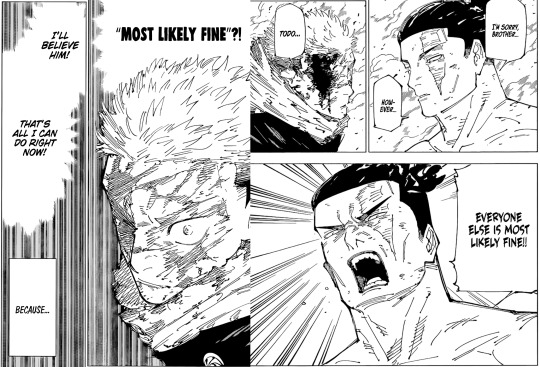
And Yuji has always been one to fall to story-like logic when things look like they're finally wrapping up.
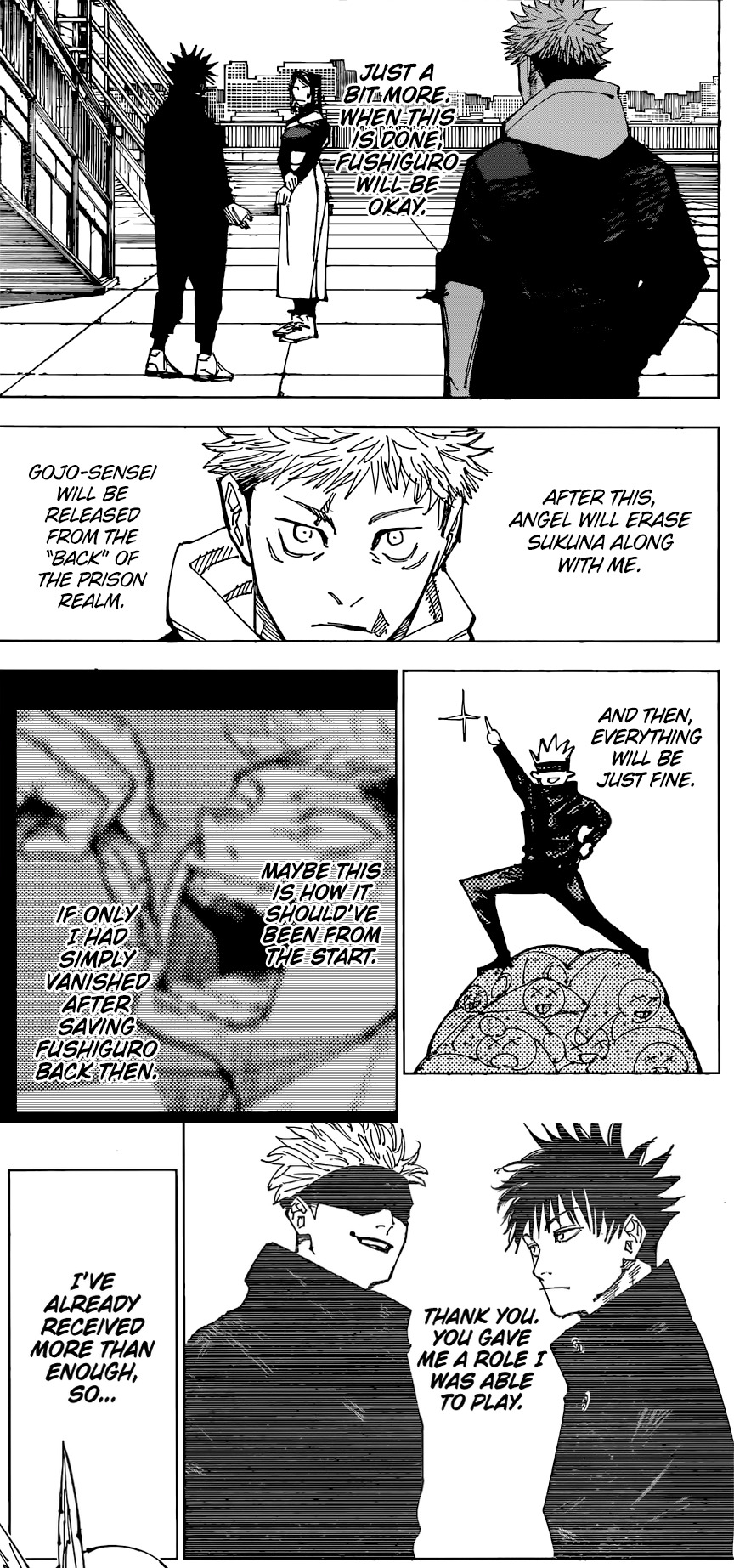
"And then everything will be just fine." (Yuji before the worst possible outcome for both him and Megumi happens.)
This is similar to the line Gakuganji uses in JJK 270. "Everything is fine." This line is the whole reason I sat down and wrote this all out without stopping. I know Gakuganji. He'd never say that. This man has been in a state of worry over Jujutsu Society since his first appearance. He doesn't even fully believe in Gojo's cause as someone who values tradition. He's a stickler for details and will do everything in his power to ensure stability. For him to toss Sukuna and Tengen's remains in a shrine and call it a day? Who is that? He's changed but not that much.
And so I compared the raws.

It is very much the same 大丈夫 (Daijoubu). These are Yuji's words.
What I'm proposing is that JJK 267–270 are Yuji's delusions of the happiest possible ending. It's a picture perfect little end where all the trauma and death has no effect on the living and people move on like nothing happened. I don't know if this means he's dead or if Megumi's dead or if they're all dead. But what I'm seeing now? I don't think it's real.
Reexamining JJK 269
CW: Brief discussion of suicide.
Even if this turns out to be a part of the smokescreen, I'm always going to hate JJK 269. But I do want to give it some grace under the assumption this chapter titled Examination (which can also be translated as Reflection) is about Yuji's guilt. Both him and Megumi's tbh. I think their feelings for each other and their situations are driving these delusions. That's one thing about this space that's real—the feelings behind them.
Yuji has a lot of guilt surrounding his existence after ingesting Sukuna, Megumi does too. Straight up Yuji has been seeking death over it since JJK 9.
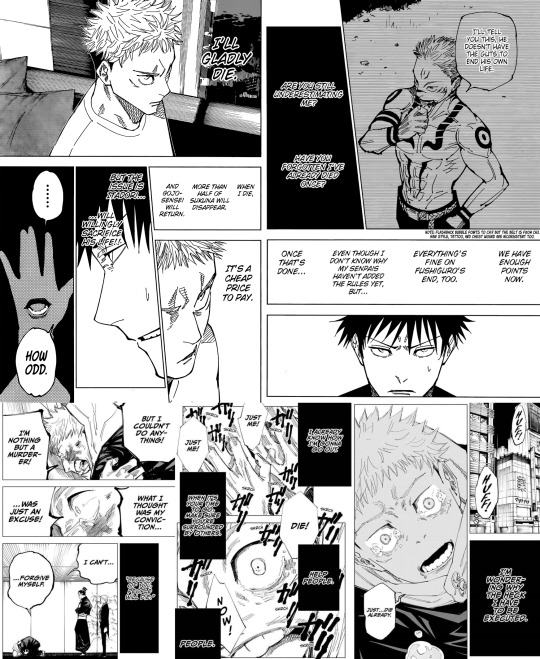
He struggles to forgive himself for being the centerpiece to violence he had little to no control over. The only thing that upsets him more than that is knowing that his death will break Megumi's heart. He doesn't want Megumi to feel any guilt for it whatsoever.
The kicker is, Megumi already knows Yuji is planning to die. And he wants to do everything to rid him of that guilt. Up until they connect inside of Yuji's domain, they were unaware they shared the same goal for each other.
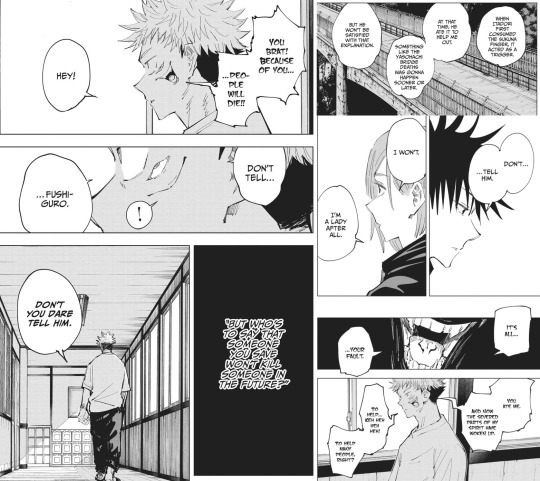
And that's what JJK 269 is. It's a very cold and harsh breakdown that allows them to forgive themselves. Blame is passed around and ultimately pinned on a combination of Gojo and Kenjaku. (It's really weird Sukuna isn't blamed either, but that's not the point of this for now.)
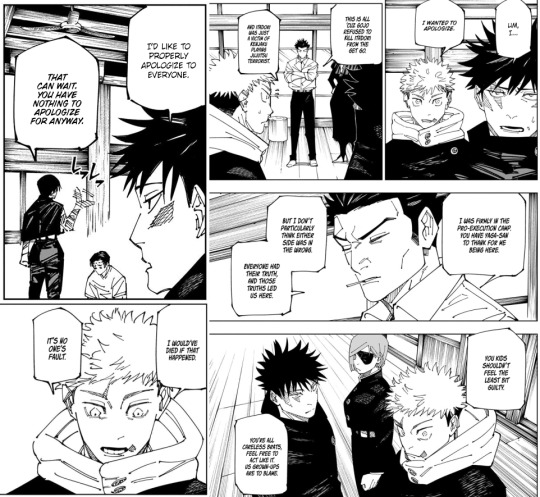
Kusakabe's comment is especially harsh. Telling Yuji point blank he should've died and that both sides on the issue were valid? He may have believed that to an extent, but he made a point of not telling it to his face. Why have a whole chapter discussing how kind he is only to turn around and do this?
If this is all a delusion, a manifestation of Yuji's guilt and trying to absolve himself of it for Megumi's sake, that makes sense. This version of Kusakabe is what Yuji feels guilt over the most—Everyone's lives being better if he died.
In the same breath Kusakabe tells them to solely blame the adults. It's very reminiscent of Nanami telling Yuji that being a child is not a sin.
It should also be noted that every single time Megumi tries to apologize for being possessed, he's stopped. Maki tears into Yuta without checking in on him, but she asks if Megumi is ok and tells him to not blame himself. JJK 270 is full of this too. He tries to apologize to Tsumiki at her grave and Shoko tells him not to sweat it. He tries to apologize to Hana and she hits on him instead.
This delusion is crafted out of love. It allows Megumi to live in a world where he can move on from the guilt surrounding his possession and saving Yuji. It's all Yuji has ever wanted for him. And now that Yuji knows Megumi wants him to forgive himself, he has no choice but to do that too.
It's a perfect ending for Megumi that's too good to be true.
It must be a dream...
There's another thing I can't reconcile about JJK 269 unless it's a delusion—Todo's explanation for Yuta's plan. It's another one of those glaring contradictions.
In JJK 269 Todo claims Boogie Woogie can't target Maki. But in JJK 259? Todo makes plans with Mei Mei knowing that it works with her.
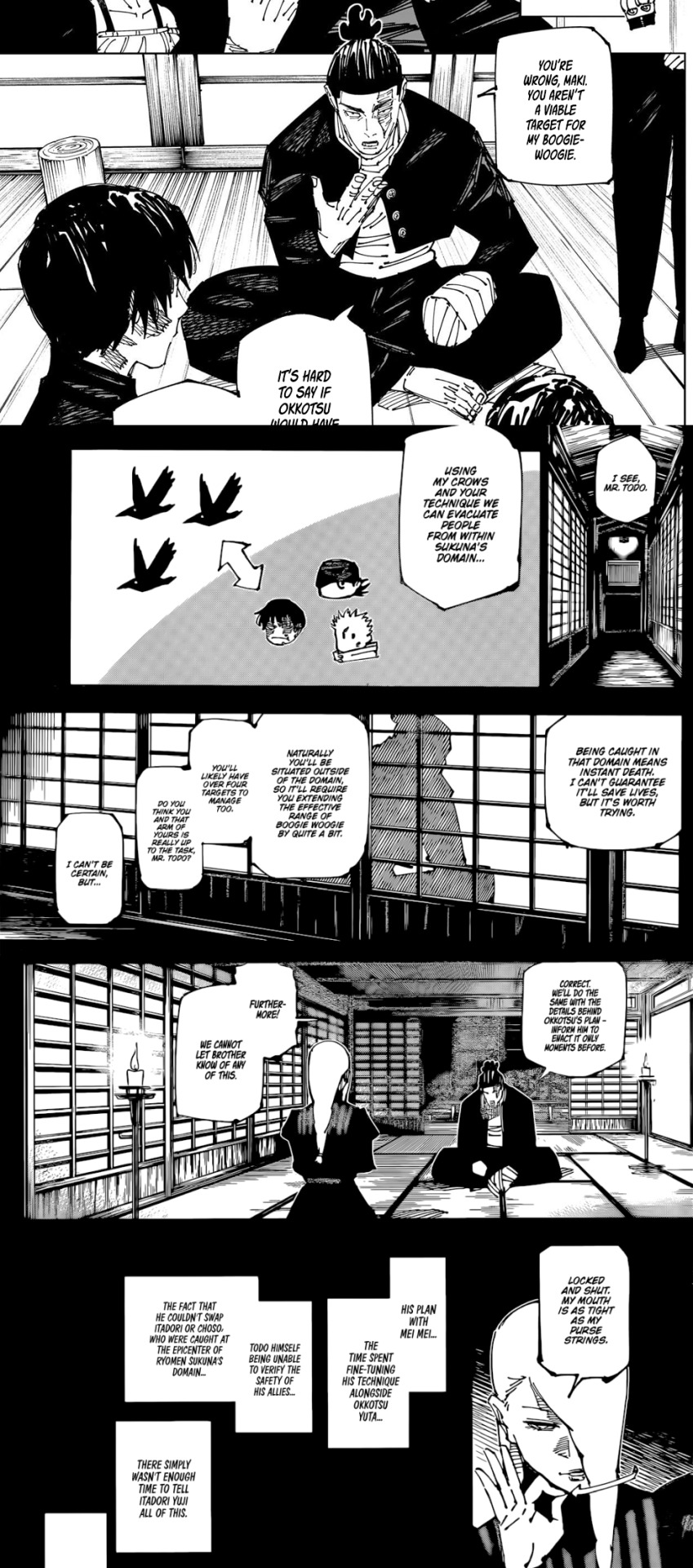
Either Todo lied...or Yuji never fully knew the plan and that Boogie Woogie could target Maki. Otherwise she would be dead. Her surviving Sukuna's flames would be impossible.
I've already talked about how Yuji believing those who may or may not be dead are alive is Todo's doing. He's always been the one to save Yuji from his breakdowns. But let's talk about his speech in Shibuya.
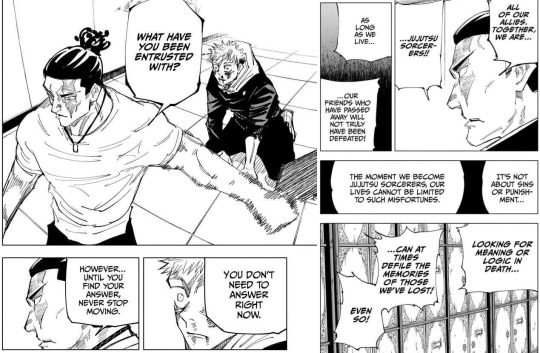
"Looking for meaning or logic in death...can at times defile the memories of those we've lost!"
Everyone who has read these past 3 chapters has really felt the defiling of Gojo's memory. And it was all in service to a strange logic that helped them cope with all this death. Acknowledging how massive Gojo's sacrifice was would riddle both Yuji and Megumi with immense guilt, so it's best to ignore it for Megumi's sake. (And perhaps that's why Yuji replaces Gojo in that memory.)
"What have you been entrusted with? You don't need to answer right now. However... Until you find your answer, never stop moving."
In a way, JJK 269 is an answer to the question Todo proposed. Yuji was entrusted with saving Megumi. Saving Megumi requires Megumi and Yuji forgiving themselves. And Yuji won't stop moving until it's done. All these time jumps and rushed developments are Yuji moving Megumi forward. He's getting that happy ending even if it's to the detriment of everything else.
What about Sukuna?
When Sukuna respects his opponents and they have a connection, he gives others these dreams before they pass. He's been very impressed by Megumi since JJK 9. It's not out of the ballpark for him to allow Megumi to die satisfied in the way Gojo did. Yuji also seems to understand that Sukuna was manipulated by others just as much as he was. I think that's why Sukuna is spared of the blame for the most part.
I don't think Sukuna won. He's probably dead. But he did warn Yuji not to underestimate him. I think the worst absolute last fudge you to Yuji he could give is this happy ending dream before ripping it all away as he dies.
In Conclusion...
I'm not sure that we're going to get that happy ending. Reggie Star warned us not too long ago.
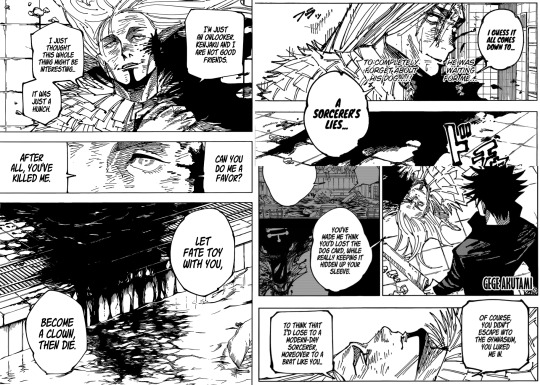
"...it all comes down to a sorcerer's lies."
Reggie is a lot like Sukuna here, outwitted by modern sorcerers and dying to someone he loathes. Sukuna is good at tricking people. He let Gojo think he won before tearing it all away. Yuta did the exact same thing to him. Or did he?
"Can you do me a favor? After all, you've killed me. Let fate toy with you, become a clown, then die."
If the last 3 chapters are delusions...Megumi will be playing the part of a clown.
Gege said the manga would end with either 1/4 or 3/4 of Yuji, Megumi, Nobara, and Gojo surviving. This of course, could be changed throughout its development, but Gege said the manga is ending in its original vision. There's a real chance that it's only Yuji or Nobara surviving.
Remember, Gege is a troll first and foremost. Somehow Gojo was revived, but in the worst way possible (Yujo). Somehow Gojo did tell Megumi about Toji, but in the worst way possible (dead man's final letter).
Gege also said this about the final chapter:
"I am working hard to create a final chapter that will (hopefully) satisfy as many people as possible who have supported Jujutsu Kaisen. So everyone, please bear with me!"
I can't think of a better way to appease everyone than by making the last 3 chapters nothing more than dream.
#cactus yaps#I asked Gege for an Umineko reference and BOY did I get one. There is a nonzero chance Yuji is doing a Battler here and that terrifies me.#I'm actually excited for next week's chapter. Gege will you follow through on what you've put down... We will see...#This is a post that will either age really well or really bad. My final gamble before the end.#This chapter brought back my ''Fever'' for JJK. Let's fudging go!#I should tag this as itafushi probably.#itadori yuji#fushiguro megumi#ryomen sukuna#jjk 270#jjk 269#jjk meta#jujutsu kaisen#jjk spoilers
2K notes
·
View notes
Text
ok sorry I just have to yell about this real quick -
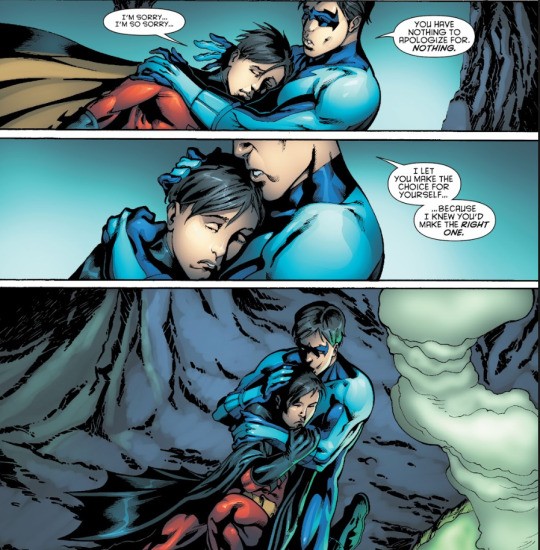
Nightwing (Vol. 2) #139 - The Resurrection of Ra's al Ghul, part 6
Dick: "I let you make the choice for yourself...because I knew you'd make the right one."
Dick didn't know shit, lmao!! "Because I knew you'd make the right one" my ass lol.
Let's rewind two minutes shall we:
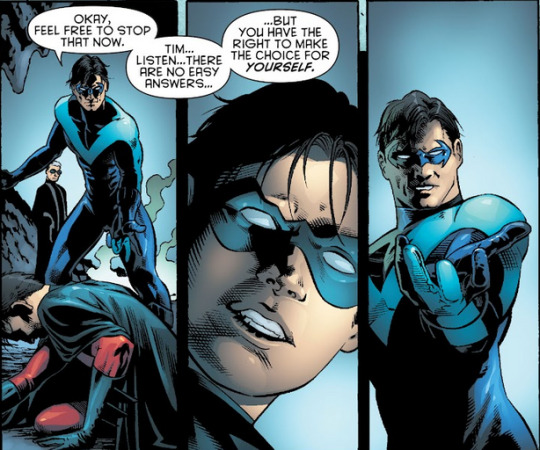
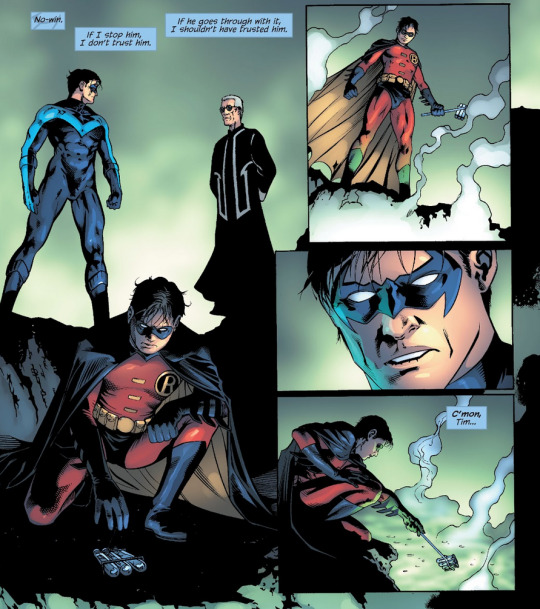
Dick: "Tim... Listen... There are no easy answers... But you have the right to make the choice for yourself." || Dick (internal narration): "No-win. If I stop him, I don't trust him. If he goes through with it, I shouldn't have trusted him. C'mon, Tim..."
He doesn't know what choice Tim is going to make, whether his grief will overcome him and he'll take the Lazarus water or not, and has in fact been physically fighting Tim this entire issue to stop him by force. But ultimately he knows it's Tim's right to choose for himself, and decides to hope, and have faith in his brother.
And he has that faith rewarded, and reaffirms it afterward, despite the fact that he wasn't sure.
And paralleling that moment of "yes of course I knew you had it":
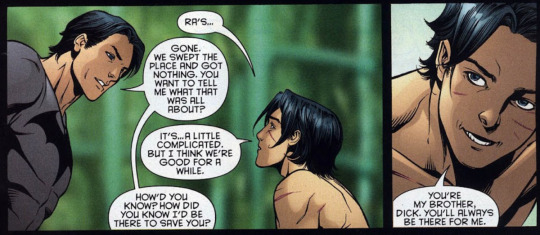
Red Robin (2009) #12
Dick: "How'd you know? How did you know I'd be there to save you?" || Tim: "You're my brother, Dick. You'll always be there for me."
TIM DIDN'T KNOW SHIIIIIIIIT HGKLJDKFLSD
At least not consciously! Being caught by Dick is certainly not something he planned for, as he seems to be trying to imply.
Again, rewind:
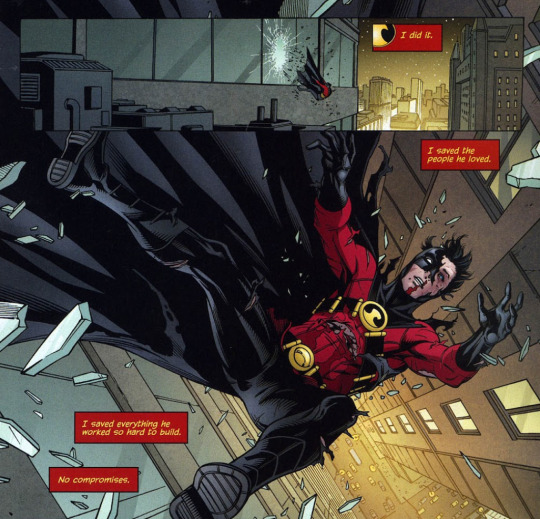
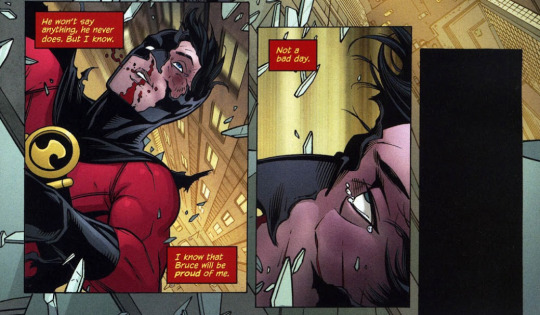
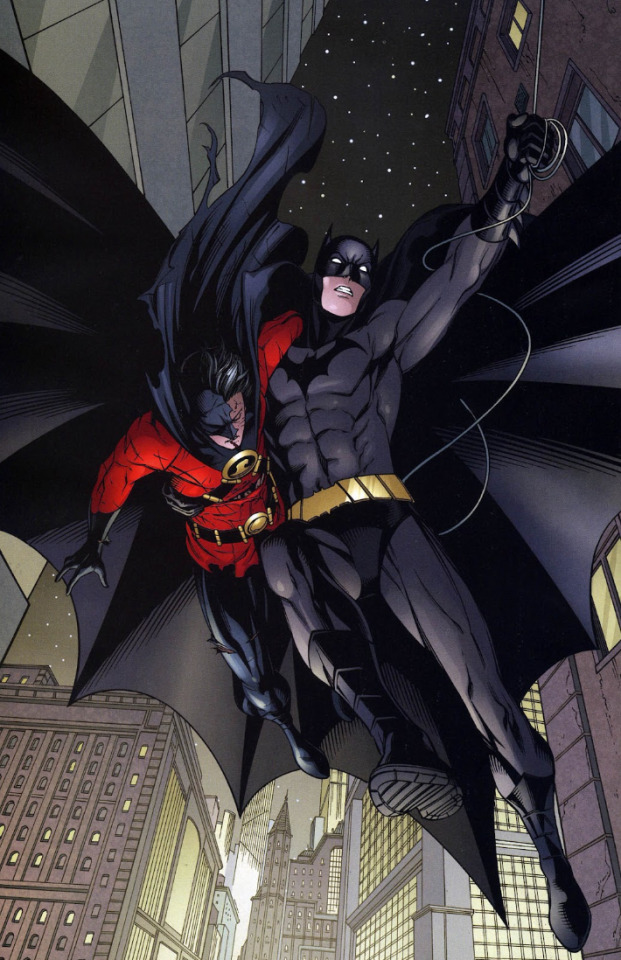
Tim (internal narration): "I did it. I saved the people he loved. I saved everything he worked so hard to build. No compromises. He won't say anything, he never does. But I know. I know that Bruce will be proud of me. Not a bad day." || Tim: (in the midst of pASSING TF OUT) || Dick: (swoops in and catches him)
Tim may not have actually known that Dick would be there. But that catch... A falling Tim being caught by Dick is a motif that occurs over and over and over across the years of their relationship. Why do I feel like there's a part of Tim, faint as he faded out, and much stronger when he woke up, that went, "Oh, it's Dick - of course if it was anyone, I knew it would be Dick"?
After their conflicts and miscommunications in this arc, after Tim sweeping back into town and explaining not a single thing as he races to thwart Ra's, despite Dick's frustrated pleas, after cutting Dick off with a simple, "Batman...trust me," and Dick's responding, "Of course"....
Tim feeling like he knew, even if he didn't know, or plan, or expect. Because that's his brother. And choosing to express that trust, after Dick chose to trust him...
Just. Dick and Tim. Verbally reaffirming their faith in each other, even after in-the-moment doubts. BROTHERS. My emotions.
#Dick and Tim#Dick Grayson#Tim Drake#dcu#batfam#Cam posts#Resurrection of Ra's al Ghul#Red Robin#Nightwing#Batman#hmmmm should I have a tag for Dick!Bats?#Dick!Bats#DC Comics panels#DC meta
1K notes
·
View notes
Text
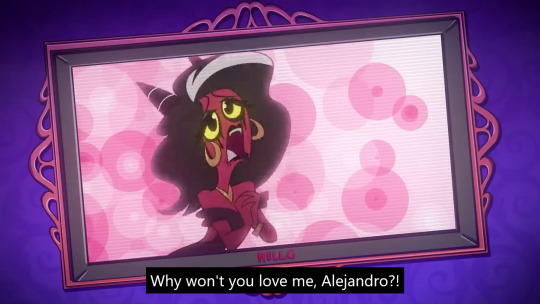
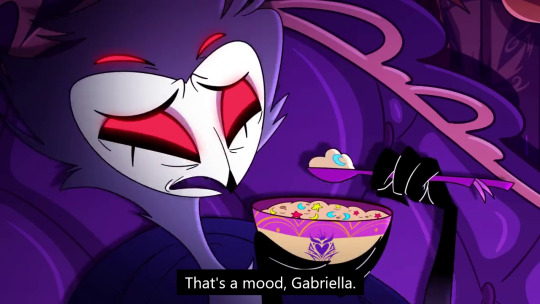
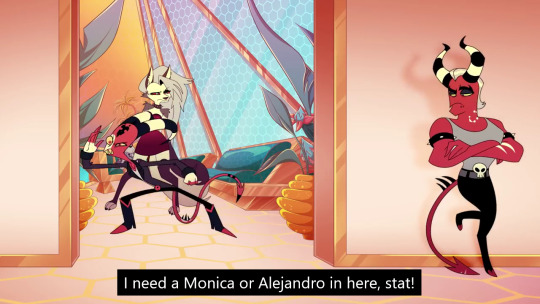
They both think they're the Gabriella of their relationship. :')
#i guess#maybe i should just make myself a talk tag#helluva boss#helluva boss stolas#helluva boss blitzo#stolitz#alternatively blitz thinks he's chandler bing#which like. he could be#helluva boss meta#i made this
3K notes
·
View notes
Text
the anti-Zutara criticism that “Zutara shippers are teenage girls who only like the ship because they self-insert as Katara” is actually so funny because how does that delegitimize the ship? So…girls who relate to Katara like Zuko, and they think Katara would like Zuko, and that’s bad because…girls are wrong? Girls are shallow? Girls don’t know what’s good for them?
Anyway if I were a grown ass man who created a fictional teenage girl that lots of real teenage girls relate to, and these girls believe she would like character B instead of character A, I hope I’d have the humility to say to myself “hmm I wonder why people who relate to this character’s feelings and motivations think she would react this way” instead of jumping straight to “these girls are doomed to like toxic relationships”
(And I know Zutara shippers like the ship for many different reasons, and self-insert is not the most popular by a long shot, I’m just saying that the criticism of self-insert stems from dismissal of what teenage girls like, and that feels kinda misogynistic to me)
#Zutara#pro Zutara#anti bryke#katara#Anti kataang#not really anti kataang but tagging it just in case#I should tag this “pro teenage girls”#My meta
1K notes
·
View notes
Text
“Crowley is still an angel deep down” “Crowley is more of an angel than any of the archangels” “Crowley was only cast out because he needed to play his part in Armageddon, he's not a real demon” “Aziraphale wants to rebuild Heaven to be more like Crowley because he’s what an angel should be” no. Stop it. This is exactly where Aziraphale went wrong.
Crowley is 100% a demon. He's not actually a bit of an angel, and he's not cosmically better than any of the other demons we see in the series. He's much less vicious than most of them, yeah, but he's also much less vicious than most of the angels, because how “nice” a celestial being is has nothing to do with which side they're technically on. Crowley's kindness comes from him doing his best to help people despite the hurt he's suffered himself, not any sort of inherent residual or earned holiness. He was cast out just like the rest of the demons, and that's an important part of his history that shouldn't be minimized, excused, or, critically, 'corrected.'
Being angelic is not a positive or negative trait in the Good Omens universe. It's a species descriptor. Saying that Crowley is still an angel deep down because he helps people is an in-character thing for Aziraphale to think, certainly--Job and the final fifteen showed that in the worst possible way--but it's not something Crowley would ever react well to, and it's the main source of conflict in the entire "appoint you to be an angel" fiasco.
We know that Aziraphale thinks Crowley's fall was an injustice, but why? Well, because Crowley is actually Good, which means his fall was a mistake, or a test, or a regrettable error in judgment, or…something. Ineffable. Etc. The point is, he’s special, much better than those other demons, and if they can fix him and make him an angel again, everything will be fine! (So once Job's trials are over, everything will be restored to him? Praise be!) Aziraphale has to believe that Crowley's better traits come from traces of the angel he used to know and not the demon he's known for 6,000 years, because that’s how he can rationalize his incorrect view of Heaven as The Source Of Truth And Light And Good with his complicated feelings about Crowley's fall.
But Crowley's fall was not an injustice because he's actually a Good Person who didn't deserve it. Crowley's fall was an injustice because the entire system of dividing people into Good (obedient) and Bad (rebellious) is bullshit. Crowley is not an unfortunate exception to God's benevolence, he is a particularly sympathetic example of God's cruelty.
And really, Crowley doesn't behave at all like an angel, especially when he's at his best. All of the things that he's done that we as the audience consider Good are things that Heaven has directly opposed. (See: saving the goats and children in defiance of God in S2E2, convincing Aziraphale to give money to Elspeth despite Heaven's views on the "virtues of poverty" in S2E3, speaking out against the flood and the crucifixion in S1E3, tempting Aziraphale to enjoy earthly pleasures because he thinks they'll make him happy, stopping Armageddon.)
Heaven as an institution has never been about helping humanity. And that's not an issue of leadership, as Aziraphale seems to think--it's by design. Aziraphale's first official act as an angel toward humanity was to literally throw them to the lions. Giving them the sword wasn't him acting like an angel, it was just him being himself. Heaven doesn't care about humans. It's not supposed to. It's supposed to win the war against Hell, with humans as chess pieces at best and collateral damage at worst.
Yes, it's easier to think that there are forces that are supposed to be fundamentally good. It's easier to think that Aziraphale is going to show those mean archangels and the Metatron what’s coming to them and reform Heaven into what it "should" be, and that God is actually super chill and watching all of this while shipping ineffable husbands and cheering for them the whole way. And of course it's easier to take Crowley, who Aziraphale (and the audience) adores, and say that he deserves to be on the Good team much more than all those angels and demons that we don’t like. But that's not how it works. People are more complicated than that, even celestial beings.
Crowley is a demon, and the tragedy of his character is not that he's secretly a good guy who is being forced to be evil; the tragedy is that he's lived his whole life stuck between two institutional forces that are both equally hostile to the love he feels for the universe and the beings in it. There are no good and bad guys. There are no "right people." Every angel, demon, and human is capable of hurting or helping others based on their choices. That is, in fact, the entire fucking point.
#good omens meta#good omens#good omens season 2#crowley#long post#i feel like this is obvious. and yet#when crowley is kind he is NOT acting angelic. the same is true of aziraphale.#(to a point. i do think aziraphale performs 'niceness' sometimes because he feels like it's something he Should do as an angel)#(but that's because aziraphale has so many issues i cannot detail them in the tags of this crowley post)#this is my second long meta post in like 3 days. sorry. it’s my first free weekend in a while
2K notes
·
View notes
Text
have i mentioned today how in love i am with the choice to have tommy call him evan?
right now, that is exactly who he is - who he needs to be. the person buck is discovering right now? the person he needs to learn to love and to accept and get to know? that is evan. evan, who felt unloved and unaccepted and uncomfortable, and spent his entire life desperately searching for something that makes sense?
he found it.
now is the time for buck to reckon with every version of him that came before, to love and accept himself. completely and wholeheartedly.
and that starts with evan.
just like when eddie said “because, evan…” he was speaking to the little boy inside of buck, the one who still lives there. the one who is terrified that he’s never going to be enough.
buck needs to heal. and that starts with evan.
853 notes
·
View notes
Text
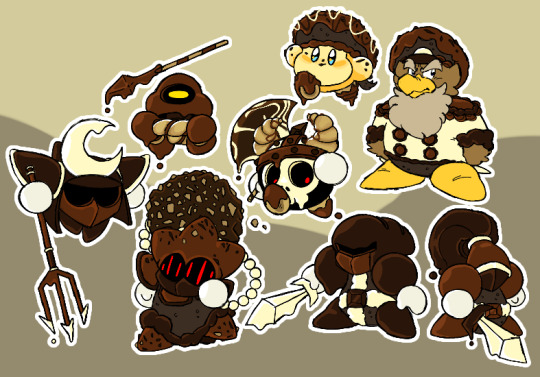
I got the halberd crew as well
#kirby#meta knights#sailor dee#captain vul#my art#huh. I should probably make a tag for this#candyland au
456 notes
·
View notes
Text
hc that Dazai made a point of calling Chuuya small when they met because Dazai was used to being the small one.
like, finally there was someone shorter than him. because let’s be real, Dazai was barely taller than Chuuya in Fifteen.
i think people forget how small Dazai was too— not just in height, but also in weight. He was underweight in Dark Era, but in Fifteen & even at present he's barely within the healthy weight range for his height. he was constantly described as a twig in Fifteen, and almost every time he's introduced in the light novels he's called lanky, slender, etc.
#even in terms of his present day height. like yes he’s tall#but he’s not even close to one of the tallest in bsd. he’s just tall compared to Chuuya#fic writers should really take advantage of the fact that Chuuya called Dazai a twig in 15#‘but what about broad shoulders Dazai?’ pretty sure that’s just how harukawa draws 😭 like basically every character has ‘broad shoulders’#if you look at it like that#i recently came to the realization that i gatekeep my hcs & theories fsr?? so i’m trying to change that lol#i wrote this in the tags of a post but figured it deserved its own post#rambling about bsd again#bsd#bungou stray dogs#soukoku#skk#bsd dazai#bsd chuuya#dazai osamu#nakahara chuuya#bsd analysis#bsd meta#tw weight#bsd hcs#skk hc
831 notes
·
View notes
Text
quick, we need to inject some unapologetic positivity into the jgy side of the mdzs fandom. i'll go first:
1) no one in this book is as devoted to their mother as jin guangyao is to meng shi, and i love that about him.
2) can you imagine being newly orphaned and rejected by your only known living relative, penniless and without prospects, only to meet the injured heir to a ravaged sect and choosing to spend what slim resources you have protecting him and keeping him safe? because that's what meng yao did for lan xichen, and i think that's insane (affectionate)
3) what a cultivation prodigy jin guangyao actually was! no formal training, no support from a sect, no guidance from a dedicated teacher or mentor, and he still possesses such a natural gift for the qin that his talent with this instrument is recognized and admired widely across the jianghu. the only cultivators with more raw talent for it than him are members of the gusu lan. iconic.
4) those watchtowers saved hundreds of thousands of commoners' lives, which is, again, something precious few members of the gentry had any interest in investing their time or resources into doing.
5) the reason that post-canon wangxian can fuck nasty on every single exposed surface of the cloud recesses is because jin guangyao spent his slim political capital after the war pressuring jgs into sparing the funds to help rebuild it. say thank you, xiandu.

for once, sect leader yao is right and he should say it.
#mdzs meta#jin guangyao#meng yao#he did crimes??? good for him 😌#truly i think we should just spam all the jgy tags with the shit we like about him#a deluge of delight
257 notes
·
View notes
Text
ideal careers for barty crouch jr besides being a domestic terrorist:
line cook
heretic
slutty eurotrash dj
eccentric, dexterous 1890s safecracker enlisted in a high-stakes heist to steal the queen’s diamonds
the guy that people mean when they say “i know a guy” in mafia movies
STUNT MAN
2000s pop-punk emo band frontman with pictures of his crotch on myspace
manipulative high society victorian-era celebrity hypnotist famous for “causing” somnambulism at his “shows”
electrician (thanks lune)
engineer, but specifically the one behind the infrastructure used in risky motorcycle stunts
slutty eurotrash club promoter
the sound-effects foley guy for b-roll action movies who is always walking around w/ headphones and holding one of those skinny boom mics
house husband
ideal careers for regulus black besides being a failed domestic terrorist:
the sullen, withholding renaissance-era muse of a tortured artist, posing in place of the angels, his enigmatic yet eerily beautiful portrait immortalized forever on the ceiling of a cathedral
critic of any kind (professional hater)
surgeon at a hospital for stuffed animals
a broken man, unfixable. a fool, hated by all, exploited till death. only in this way will he be redeemed
cunty benedictine monk
#ARGUE WITH THE WALL#barty meta tag#actually. teacher should be on here. i feel like that’s the one profession we know definitively that he’s good at#the fact that he’s a gifted teacher and actor……….. he was so so precious. the main character#saints speaks 🐇
367 notes
·
View notes
Text
Something I really appreciate about TOA that I don’t see get talked about much is that I never get the sense that Apollo finds Lester ugly.
For all that he complains about the body he’s stuck in, I never got the feeling that it came from a distaste for Lester himself. When he sees Lester’s traits reflected in others, like Meg being chunky, he is completely unaffected by it. Finds it charming, even. (In fact, the only times I can remember him having Opinions about how someone looks is when they’ve chosen something about their appearance that he either approves or disapproves of, like a tacky jacket/hair cut or when he finds someone attractive. The only time I can remember him calling anybody ugly was when he pointed out that Dionysus was choosing to look as ugly as possible to piss of Zeus, which is a statement of fact and doesn’t necessarily mean he thinks that Dionysus’ form is actually ugly. He makes no mention of finding it so before or after that line. It’s a statement of fact that Dionysus is choosing a form that either he or Zeus finds ugly to piss of their dad.)
The thing about Lester is that he is so devastatingly mortal. He has flab and acne and no upper body strength and his voice squeaks when he’s nervous and he sweats a lot and he has a silly name and messy, curly hair that’s impossible to tame. He is the Most Teenager To Ever. There is no godly blood running through his veins, no powers he can call upon. If Apollo were to run into him in the street, I don’t think he’d pay him much mind. He’d probably just think, “sweet kid”, and move on. If he got to know him, I think Apollo would adore him because that’s just who rrverse!Apollo is. He loves mortals despite himself, flaws and all. He’d argue against anything bad Lester had to say about his own appearance and mean every word.
The problem is that it’s Apollo in this body. Apollo, The Golden Child, the perfect son, a God. His distaste for this body is because Lester is so devastatingly mortal and imperfect. Apollo has to be perfect, he has to be shiny and pretty and strong because he has nothing else to offer otherwise.
And.. I dunno, there’s something about Apollo hating the things that draw him to others when it’s him. The flaws that he tears apart in himself he finds endlessly charming on others, or he thinks that they have better reasons for why they have them, or he thinks they have enough positive traits to counteract them. The positive things that he hides deep enough that even the reader can’t see right away, like his kindness and genuine desire to understand and connect with everyone around him, that he’s shocked to find directed at him in turn.
That Apollo accepting himself and reclaiming his personhood leads to him being comfortable with being Lester, imperfect and mortal as he is. That he takes that imperfection back with him to Olympus… I dunno man I’m Emotional. Also it’s just plain nice that Lester is never treated as ugly for looking like a normal ass teenager, even by the guy stuck in this body. That’s neat.
Or maybe I’m just rambling and this means nothing at all and I’m reading too far into Blorbo from my books.
#DOES THIS MAKE SENSE. is this too rambly. AUGH.#words machine ALWAYS broke and I forget everything I’m trying to say the moment I try to write or type it out#which results in long ass posts like this. this could’ve been 3 sentences probably#TOA#trials of Apollo#rrverse!apollo#lester papadopoulos#snack time#should I tag this as meta?? I dunno
832 notes
·
View notes
Text
something about how both wei wuxian and jin guangyao repeatedly say they ‘didn’t have a choice’ in their actions. in both cases, it’s not literal impossibility, instead determined by their mindsets and personal conduct…. but while for wei wuxian that means he can’t do something immoral, even if it means losing all his social power, for jin guangyao it means he can’t do anything to lose his social power, even if it means doing something immoral. the other option is still there, but it’s never one they’d pick.
something about how they’re trying to walk the same path but in opposite directions: wei wuxian willingly left the nice, broad road in favour of upholding morals and debts, while jin guangyao is trying to claw onto it and stay there by any means necessary. in both cases, being parted from it so easily is only possible because this nice, broad road — full of people whose social power is unconditional, given at birth, independent of their actions — was never truly theirs to begin with. but despite how it is possible to be forced off due to nothing, as we see with wang lingjiao, the positions of both these characters were ultimately due to actions they took.
(about how no matter the similarity of the paths, no matter the narrowness of the choices, the direction you take is still up to you.)
#i’m a little insane about this metaphor in case you couldn’t tell#also clarification: ‘immoral’ for the case of wwx means something against his personal morals (a major example would be giving up the wens)#whereas for jgy i mean ‘something generally against most people’s morals eg killing his son and participating in torture’#since he doesn’t really HAVE personal morals and his goals are independent on that#but phrasing it like this is much less awkward…#anyway i LOVE the theme of choice here — how everyone *does* have one but aims/morals influence that to the point that choosing a certain-#-option SEEMS like an impossibility#but you still are responsible/should be responsible for those choices (see: the story justfully questioning jgy’s ‘i had no choice’ line)#so jgy WAS responsible for his choices (and wwx *could’ve* also chosen to do what’s easier — not giving up the gc not protecting the wens)#(but didn’t and that’s to his credit)#despite the circumstances for both being unideal it’s still your choice IN the circumstances — not the circumstances — that determine what-#-kind of person you are#mdzs meta (?)#pretty sure it counts but i also know i’ve been taking up a lot of this tag recently…#mdzs#魔道祖师#mo dao zu shi#grandmaster of demonic cultivation#gdc#wei wuxian#jin guangyao#my meta (?)
359 notes
·
View notes
Note
Hello! I just saw your latest post and you might have been referring to my ask if it was the one about Ratiorine's differing philosophies or of what philosophies they abide by (existentialism, absurdism, etc) then that's me! If you weren't referring to that I apologize for the confusion. Sending it off anon this time so maybe it doesn't disappear 🥲
Sorry for the ask disappearing the first time; I'm not sure what happened, and I was so sad because I had been carefully holding on to it to answer it! I'm glad you were able to resend.
I do have to say first that philosophy is not my area of expertise, so there may be much more qualified philosophy buffs out there who can answer this more accurately than me, but I'll give it a go with my personal understandings of the characters:
First, Ratio is the easier of the two I think. As many people have said, he's a good fit for existentialism. His entire shtick is basically believing in the power of the individual to improve and enrich their own life, to fight valiantly regardless of the hardships imposed by their life's circumstances, and to make themself into a better person by their own choices.

It's important to underscore that this means Ratio believes in self-determination, in the idea that people's lives are not foreordained but are actually actively shaped each day by personal decisions. Therefore, people have inherent freedom to decide the course of their own lives by accepting what they approve of, refusing to accept what they disapprove of, and harnessing their own individual power to ultimately achieve self-actualization.

Essentially, Ratio works under the impression that life is not guided by something as intangible as destiny, and no matter where you start off in life, what ultimately happens to you is within your control (or at least within the control of whoever controls you). This is likely a small part of why it grates on him so badly that he wasn't recognized by Nous, because the fact that one can dedicate everything to a goal and still not achieve that goal runs contrary to his central philosophy.
If he believes that people have the power to determine the course of their own lives, then what does it say about him, who fought so hard to do exactly as he claims even idiots can do--seize control his own fate--and yet didn't succeed? Are there some things outside of man's power? It's enough to make even a renowned doctor question himself, and Ratio decided to come out on the side of "It's a personal failing, not a flaw in my philosophy." He literally said "Skill issue" to himself.

Changing tack a tiny bit here, I think it's also important to emphasize that there is a difference between existentialism and nihilism even though these philosophies dovetail. Again, I'm not an expert in philosophy, so my understanding is very limited, but the basic idea of existentialism is that "existence comes before essence"--that is, things start as a blank slate and gain nature and meaning after the fact. We are not created by some grand design, nor is there any inherent "purpose for living." Things just exist because they exist.
This is where existentialism intersects with nihilism, at the starting point that existence is inherently meaningless. But, in my personal opinion, nihilism as a philosophy fails to move beyond that. Pure nihilism is ultimately self-defeating because it leaves us with no motivation to commit to growth. It's a philosophy antithetical to the continuation of life as we know it. Existence is meaningless and any meaning you personally derive from existence is also meaningless, so why bother attempting to derive any meaning at all? This complete apathy is the Device IX that Star Rail paints as so dangerous.

And Ratio is not this way at all. His philosophy absolutely reaffirms that life can have meaning, so long as people create that meaning for themselves. He simultaneously asserts that anything that people create is not meaningless ...which basically means that meaning itself cannot be meaningless. (If that makes any sense to anyone.)
Frankly, I would argue that this philosophy may be a core part of why Ratio has not been recognized by Nous so far, rather than simply his "being a good person." (Nous is a robotic AI super-computer, why would THEY care about the presence or lack of human empathy?) Ultimately, Ratio's central philosophy about people being capable of determining their own fates and purposes also applies to his understanding of knowledge--knowledge is not something which is inherent in certain beings from birth or limited to the purview of the "special" (geniuses), but is attainable by all people. People are not "born talented" or "born untalented," they are simply "educated" or "uneducated," with the only barrier between these categories being one's own personal willingness to change. The mundane can become the divine--if they work hard enough at it.

Thus, knowledge is not wealth to be hoarded, but a currency to be spent to enrich other members of humanity.
(By the way, completely random aside--it also surprises me that everyone relates Ratio to Alhaitham from Genshin when they literally have such a glaring fundamental discrepancy in their understanding of the concept of wisdom... But anyway, back on topic!)
Ratio may (sort of) respect the members of the Genius Society, may recognize their incredible knowledge and abilities, but at the heart of the matter lies a single all-important question: Does Ratio even really believe in "genius" as a distinction (other than as a concept to insult himself)? Does he truly believe there is barrier between brilliance and idiocy that "ordinary people" can never cross?

He speaks convincingly about geniuses being different from "the ordinary," but if his core belief is that people have the power to pull themselves up out of despair and achieve greatness through effort and self-development, rather than some form of luck or god-given talent at birth, then... do born "geniuses" even really exist? Is there really an insurmountable difference between brilliant and mundane?
If knowledge is the equalizer of all sentient beings, do we not all have at least the initial capacity to become geniuses?
I personally think this central distinction about the capacity for knowledge among all humanity is the actual deciding factor in Ratio's rejection from the Genius Society, because, at the end of the day... how do you become a member of the "Genius Society" when you fundamentally reject the distinction of "genius" as an exclusive category from the start?

Ratio wants to share knowledge and uplift everyone (even if he thinks most people are starting off at the rock bottom known as idiocy).
His mission is diametrically opposed to the concept of a "Genius Society" in the first place.
He wanted in to the cool kids club because he desperately craves validation and acceptance, but the philosophical values of the Genius Society are ultimately incompatible with his own. In short, he would have to cease to be "Veritas Ratio" to succeed in joining the geniuses.
Okay, okay, back to the original point again, and just one more note about Ratio: Even though existentialism also goes hand-in-hand with absurdism, I don't think Ratio is far enough down the philosophical rabbit hole to believe in the wider definition of absurdism. Although I think he does agree with the inherent meaninglessness of existence, I don't think he views existence itself as truly irrational and the universe as as manifestation of unknowable chaos. I think he'd at least like to imagine that there are some ontological principles and inherent laws governing the operations of reality, and I think he does believe that certain things can be predicted with the application of enough thought... He certainly seems to believe in some form of "objective truth," at the very least.

I think he'd at least like to believe the universe is semi-orderly, even if he might deep down admit this is also wishful thinking.
So, to me he reads as a strong metaphor for pure existentialism, with deliberate rejections to both nihilism's apathy and absurdism's lean toward solely subjective reality.
PHEW, this is already long and I still have a whole other character to talk about... I had more to say about this topic than I thought. Sorry for the long read!
Anyway... Aventurine.

I've seen all sorts of things thrown around for Aventurine's philosophy, and while I think he does inherit a bit of Acheron's absurdism by the end of 2.1, I actually don't think Aventurine is an absurdist, an existentialist, or a nihilist.

I think Aventurine is a struggling fatalist.
He doesn't like it. We see him actively question it, but ultimately, he does come back to the concept of destiny over and over.

First, I think it's important to draw a clear distinction between Ratio and Aventurine: Ratio's existentialism is a philosophy that technically works even in a theological vacuum. Nous doesn't have to exist for Ratio's philosophy to function. Ratio's belief in the self-determination of humanity is, in fact, somewhat opposed to belief in aeons in the first place, and only works because technically the aeons of Star Rail used to be human (or were originally human creations). It's essentially an atheist viewpoint.
But Aventurine is a religious character. Like, he's just... religious. That's a fact about him. Even though we do hear his doubts, at the end of the day, he actually believes in Gaiathra, and believing in a omniscient supernatural being that is not human in origin (is from outside the aeon system) comes with a whole set of philosophical foundations that most aeon-worshipping characters just don't have in Star Rail. (Sunday is the obvious exception here, by the way.)

Kakavasha's like the one practicing pagan in the middle of an atheist convention. Awkward.
Being more serious: Religion requires faith. Faith requires the ability to believe in things you cannot verify with empirical facts. To believe in things you can only feel, never see. The belief that a goddess is watching over you, blessing you, and guiding you requires you to also accept the idea that events in your life are not always in your own control--that some of what occurs to you is decided by powers beyond your comprehension.
In essence, faith requires belief in fate. And that leads to fatalism.


No matter how much he doesn't like it, no matter how much we see him struggle with it, Aventurine does actually seem to believe in the concept of fate. He believes that some events in life are destined to occur, that some things are outside of individuals' control, and that ultimately not everything can be changed.
This is the dead opposite of Ratio's mindset: No matter how hard we fight, how far we push ourselves... in the end, sometimes people fail. Sometimes the only answer to our endless struggles is that we die, as we were destined to, before ever achieving the greatness we sought or the futures we were promised.

As an aside, I don't think faith or religion are necessarily the only factors connecting Aventurine to this particular philosophy either. Even removing theological aspects from the conversation, his extreme focus on the gambling aesthetic suggests a strong connection to fatalism too--if not a goddess, then one's fate may as well be in the hands of luck itself, of the whims of the rolling dice--or the push and pull of "powers that be," those figures of authority in the room where it happens, who make their shady deals according to preset rules and expectations, every bet resulting in an ultimately predictable outcome.
(He keeps gambling and gambling, hoping that he'll get a different result than the one he knows is inevitable...)
This is, of course, an inherently pessimistic mindset, a perfect dark-mirror to Ratio's deep-down optimism. Fatalism puts humanity into a position of powerlessness. All hopes and dreams are given over to the goddess, by whose judgment and whims the actual events of one's life are decided. Pain and poverty are inevitable trials. Suffering and death are foreordained.

And yet Aventurine has to cling to this, as much as he doubts it, as much as he hates the idea that things in his life are beyond his power to control.
Because if fate doesn't exist... If it wasn't destiny, if the tragedies of his life weren't trials from the goddess, if things weren't supposed to go this way... Then every single thing in his life really is meaningless. Everything he suffered, everyone he loved and loss, his mother's and sister's sacrifices, the torment he went through--just sheer bad luck. All of it, completely and utterly meaningless.


How can you convince yourself to keep living, in the face of such supreme and all-encompassing Nihility?
This is the central struggle of Aventurine's character, the actual mental and emotional journey we see him undertaking from 2.0 to 2.1. He is literally on the precipice, swinging between a viewpoint that he hates--his fatalistic belief in destiny--and an entirely self-defeating philosophy--nihilism--whose only possible final outcome is suicide.

This is what his talk with Acheron at the end of 2.1 is all about. This is how she saves him. In that final cutscene, we witness Aventurine reach a mental compromise, managing to finally reconcile his necessary faith in the concept of destiny with the reality that life may truly begin meaningless--but beginning meaningless does not mean staying meaningless, and believing in destiny does not bar you from making your own choices or finding your own purpose in life.
Later on in Penacony's story, we literally see Acheron use Ratio's philosophy to reject the same nihility that crept into Aventurine's:


Acheron wards off nihility's apathy through an absurdism all her own, but one which manages to enclose both Ratio's and Aventurine's otherwise incompatible mindsets: We have no way of ever knowing for certain whether the events of our lives are fated or mere nonsense. We have no way of knowing if our choices are our own or foreordained. But we don't need to know this to find meaning and value in them. Whether life is nothing more than unpredictable chaos or a predetermined pattern of cause and effect, what matters is what you make of it.

Ultimately, I think that this post has really helped me recognize just how well Aventurine and Ratio work as philosophical foils.
They really are perfect opposites.
Aventurine's fatalism is deterministic, while Ratio's existentialism is self-deterministic. Aventurine's philosophy is inherently pessimistic; Ratio's is inherently optimistic. Ratio's philosophy operates on a core belief in the freedom of humanity to decide their own paths in life, while Aventurine hates but does ultimately believe that people aren't really in control, that even if no gods are guiding us, we can't rise above our own natures. Ratio's philosophy makes meaning from growth; Aventurine's makes meaning from loss...
And they both struggle with fundamental doubts in their own philosophies, core questions that are directly tied to their own lives. Aventurine worries that his faith might be misplaced, that destiny might not exist, and that everything he suffered might have been in pointless, empty vain. Ratio faces the crisis of recognizing that his core belief in the power of humankind to determine their own paths and make their own meaning might not actually apply to everyone--because it doesn't seem to apply to himself.

It's literally only by bridging this philosophical binary with Acheron's anti-Nihility absurdist rhetoric that we can reach some sort of healthy outcome. That's why it takes both Ratio's note and Acheron's comments to finally lead Aventurine to acceptance. Ratio probably needs a little bit of Aventurine's "If you didn't make it into the Genius Society, there's got to be a reason" mindset to finally reach some peace with his situation too.
I'm not even a philosophy expert and even I can see that there's really only one takeaway here: These two characters were totally written with each other in mind.
Aventurine and Ratio need each other on core metaphysical levels! 😂

It's so good guys. You can't see it, but I'm making chef's kisses, I promise.
#honkai star rail#aventurine#dr. ratio#ratiorine#aventio#well the implication is there at least#character analysis#honkai star rail meta#philosophy#long post is long#this took so long oops I'm posting at 2am#entirely unrelated but innenofutari#you are very based for having a Princess Tutu quote in your bio#that's the most important thing I could tag this post with#actually#also if my philosophy understanding is all wrong I'm sorry#not gonna lie I dated a philosophy major in college soooo#that should tell you everything you need to know about my feelings toward philosophy
177 notes
·
View notes
Text
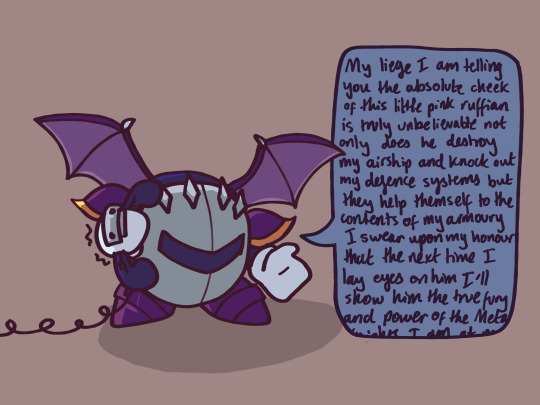
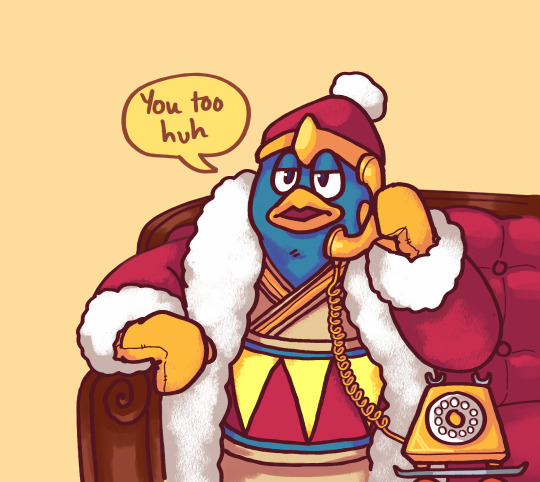
thinking about meta ringing dedede at the end of revenge of meta knight and chatting mad shit and dededes just like damn that's crazy (looks at the rematch he has planned with kirby later that week)
#kirby#kirby of the stars#meta knight#king dedede#kirby super star#kirby super star ultra#my art#digital#digital art#fanart#this is embarrassing to post and i cannot explain why its just that my brain is wired strangely. lmao and lol#not intended as ship but you can tag as ship if you like iont really mind#i did the shadows for mk and then realised 'wait i think the lighting is going to be really gloomy i should do another layer of shadows'#And Then I Didn't
434 notes
·
View notes